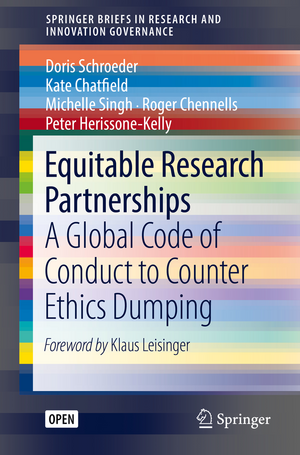Equitable Research Partnerships: A Global Code of Conduct to Counter Ethics Dumping: SpringerBriefs in Research and Innovation Governance
Autor Doris Schroeder, Kate Chatfield, Michelle Singh, Roger Chennells, Peter Herissone-Kellyen Limba Engleză Paperback – 13 iun 2019
Din seria SpringerBriefs in Research and Innovation Governance
-
 Preț: 414.21 lei
Preț: 414.21 lei -
 Preț: 140.82 lei
Preț: 140.82 lei -
 Preț: 353.28 lei
Preț: 353.28 lei -
 Preț: 348.32 lei
Preț: 348.32 lei -
 Preț: 410.77 lei
Preț: 410.77 lei - 20%
 Preț: 223.51 lei
Preț: 223.51 lei -
 Preț: 442.62 lei
Preț: 442.62 lei -
 Preț: 260.38 lei
Preț: 260.38 lei
Preț: 173.63 lei
Nou
Puncte Express: 260
Preț estimativ în valută:
33.22€ • 34.79$ • 27.56£
33.22€ • 34.79$ • 27.56£
Carte disponibilă
Livrare economică 19 martie-02 aprilie
Preluare comenzi: 021 569.72.76
Specificații
ISBN-13: 9783030157449
ISBN-10: 303015744X
Pagini: 130
Ilustrații: XIX, 122 p. 12 illus., 11 illus. in color.
Dimensiuni: 155 x 235 mm
Greutate: 0.18 kg
Ediția:1st ed. 2019
Editura: Springer International Publishing
Colecția Springer
Seria SpringerBriefs in Research and Innovation Governance
Locul publicării:Cham, Switzerland
ISBN-10: 303015744X
Pagini: 130
Ilustrații: XIX, 122 p. 12 illus., 11 illus. in color.
Dimensiuni: 155 x 235 mm
Greutate: 0.18 kg
Ediția:1st ed. 2019
Editura: Springer International Publishing
Colecția Springer
Seria SpringerBriefs in Research and Innovation Governance
Locul publicării:Cham, Switzerland
Cuprins
Foreword.- Acknowledgements.- Chapter 1. Ethics Dumping and the Need for a Global Code of Conduct.- Chapter 2. A Value-Based Global Code of Conduct to Counter Ethics Dumping.- Chapter 3. The Four Values Framework: Fairness, Respect, Care and Honesty.- Chapter 4. Respect and a Global Code of Conduct?.- Chapter 5. Exploitation Risks in Collaborative International Research.- Chapter 6. How the Global Code of Conduct Was Built.- Chapter 7. The San Code of Research Ethics.- Chapter 8. Good Practice to Counter Ethics Dumping.- Chapter 9. Towards Equitable Research Partnership.- Appendix.
Notă biografică
Kate Chatfield is deputy director of the Centre for Professional Ethics, University of Central Lancashire, UK. She is a social science researcher and ethicist specializing in global justice, research ethics, animal ethics and responsible innovation.
Roger Chennells works as legal adviser to the South African San Institute (SASI) and is a founder-partner in the human rights law practice Chennells Albertyn, Stellenbosch, established in 1981. Specializing in labour, land, environmental and human rights law, he has also worked for Aboriginal people in Australia.
Peter Herissone-Kelly is senior lecturer in philosophy, University of Central Lancashire, UK. He is a specialist in Kantian ethics as well as bioethics, analytic philosophy of language and metaethics.
Doris Schroeder is director of the Centre for Professional Ethics at the University of Central Lancashire, and professor of moral philosophy at the School of Law, UCLan Cyprus.She is the lead author of the Global Code of Conduct for Research in Resource-Poor Settings.
Michelle Singh is a project officer at the European & Developing Countries Clinical Trials Partnership (EDCTP) in Cape Town, South Africa. She holds a medical PhD and previously managed maternal and child health research studies and clinical trials at the South African Medical Research Council.
Roger Chennells works as legal adviser to the South African San Institute (SASI) and is a founder-partner in the human rights law practice Chennells Albertyn, Stellenbosch, established in 1981. Specializing in labour, land, environmental and human rights law, he has also worked for Aboriginal people in Australia.
Peter Herissone-Kelly is senior lecturer in philosophy, University of Central Lancashire, UK. He is a specialist in Kantian ethics as well as bioethics, analytic philosophy of language and metaethics.
Doris Schroeder is director of the Centre for Professional Ethics at the University of Central Lancashire, and professor of moral philosophy at the School of Law, UCLan Cyprus.She is the lead author of the Global Code of Conduct for Research in Resource-Poor Settings.
Michelle Singh is a project officer at the European & Developing Countries Clinical Trials Partnership (EDCTP) in Cape Town, South Africa. She holds a medical PhD and previously managed maternal and child health research studies and clinical trials at the South African Medical Research Council.
Caracteristici
Describes a Code that is a mandatory reference document for EU framework programs Explains the process of building a code of conduct with diverse stakeholders Presents an alternative to Beauchamp & Childress’ Principlism built by a global group
